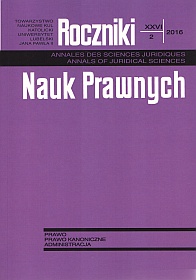The Future of Areements Concluded by Spain with the Holy See Legal Issues (According to the Programs of Political Parties on the General Elections in 2015)
Abstract
Prof. Remigiusz Beneyto Berenguer PhD, professor of law on religion at the University Cardinal Herrera of Valencia, since 2015 member of the Royal Academy of Jurisprudence and Legislation, in the paper composed of three articles, analyzed the election programs of political parties presented due to the general elections in December 2015 with regard to the issues of religious freedom, the principles of the Spanish law on religion, and particularly their relation to the agreements in force with the Holy See.
In the first article – concerning issues of legal personality of ecclesiastical organization units regulated in partial agreements in 1979 – after the introduction (I) he shows the legal value (II); indicates a concordat as a basic norm in Europe, including the contemporary one (III). Analyzing the position of the parties in relation to the legal issues regulated in the agreements (IV) he comes to the conclusion (V) that the programs of the People’s Party and the Citizens’ Party do not make any reference to these agreements, while other postulate their termination by the government, without taking into consideration the Art. 27 of the Vienna Convention on the Law of Treaties, or Art. 96.2 of the Constitution (according to Art. 94 the procedure of the termination of international agreements should be the same as for their ratification) and Art. 94.1 demanded the Parliament’s consent, because the agreements concern the right of religious freedom. The Author emphasizes that those who postulate forget that the termination of agreements with the Catholic Church, would create the need to terminate their agreements with the Federation of Evangelical Religious Entities of Spain, the Federation of Jewish Communities and the Islamic Commission of Spain from 1992. Furthermore, the proposed action would not be understood in the international forum, if the majority of the European Union countries regulate their relations with the Catholic Church by the international agreements, taking into account the legal personality of the Holy See. For the Catholic Church the postulates will pose the threat to the freedom of action, perform the duties of teaching and jurisdiction related to its mission. Especially if the government will decide what is “religious” and what is not.
References
Beneyto Berenguer Remigio, La reforma de la Ley Orgánica de Libertad Religiosa, [en:] M. Martínez Sospedra (Coordinador), La Constitución española de 1978 después de su trigésimo aniversario, Tirant lo Blanch, Valencia 2010, p. 71-112.
Llamazeres Fernảndez Dionisio, Derecho de la libertad de conciencia I. Libertad de conciencia y laicidad, Civitas, Madrid 1997.
Mantecón Sancho Joaquín, España: ¿Y si se denunciaran los Acuerdos con la Santa Sede?, [en:] „Revista General de Derecho Canónico y Derecho Eclesiástico del Estado” 39 (2015).
Minnerath Roland, L´Église Catholique face aux États. Deux siècles de pratique concordataire (1810-2010), Cerf, Paris 2012.
Corral Salvador Carlos, Los sistemas político-religiosos de los 27 Estados miembros de la Unión Europea y sus correlativos principios constitucionales. Cuadernos de Integración Europea, 2006, 7, pp. 5-18, http://dialnet.unirioja.es/servlet/articulo?codigo=2392763; http://www.Cuadernosie.info [15.04.2016].
Meseguer Velasco Silvia, “Avances y retrocesos en la protección jurídica de la libertad e igualdad religiosa en España”, [en:] „Revista General de Derecho Canónico y Derecho Eclesiástico del Estado” 39(2015), Iustel, http://www.iustel.com/v2/revistas/detalle_revista.asp?id=2&numero=39 [15.04.2016].
Olmos Maria Elena, Legislación eclesiástica, Civitas Thomson Reuters, 22ª edición, Cizur Menor (Navarra) 2010.
Beneyto Berenguer Remigio, Problemas jurídicos del patrimonio de la Iglesia Católica [en:] „Revista General de Derecho Canónico y Derecho Eclesiástico del Estado” 39 (2015), Iustel, http://www.iustel.com/v2/revistas/detalle_revista.asp?id=2&numero=39 [15.04.2016].
Herrera Ceballos Enrique, El registro de entidades religiosas: estudio global y sistematico, S.A. Eunsa, Navarra 2012.
Herrera Ceballos Enrique, Hacia la construcción de un Registro fiel reflejo de la Realidad. La reforma del Registro de Entidades Religiosas, [en:] „Revista General de Derecho Canónico y Derecho Eclesiástico del Estado” 39 (2015), Iustel, http://www.iustel.com/v2/revistas/detalle_revista.asp?id=2&numero=39 [15.04.2016].
Copyright (c) 2016 Roczniki Nauk Prawnych

This work is licensed under a Creative Commons Attribution-NonCommercial-NoDerivatives 4.0 International License.


